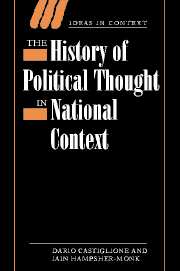Book contents
- Frontmatter
- Contents
- List of contributors
- Preface
- 1 Introduction The history of political thought and the national discourses of politics
- 2 The voice of the ‘Greeks’ in the conversation of mankind
- 3 History of political theory in the Federal Republic of Germany: strange death and slow recovery
- 4 A German version of the ‘linguistic turn’: Reinhart Koselleck and the history of political and social concepts (Begriffsgeschichte)
- 5 One hundred years of the history of political thought in Italy
- 6 Discordant voices: American histories of political thought
- 7 The professoriate of political thought in England since 1914: a tale of three chairs
- 8 The history of political thought and the political history of thought
- 9 The rise of, challenge to and prospects for a Collingwoodian approach to the history of political thought
- 10 Towards a philosophical history of the political
- 11 ‘Le retour des émigrés’? The study of the history of political ideas in contemporary France
- 12 National political cultures and regime changes in Eastern and Central Europe
- 13 The limits of the national paradigm in the study of political thought: the case of Karl Popper and Central European cosmopolitanism
- 14 Postscript. Disciplines, canons and publics: the history of ‘the history of political thought’ in comparative perspective
- Index
- IDEAS IN CONTEXT
7 - The professoriate of political thought in England since 1914: a tale of three chairs
Published online by Cambridge University Press: 23 September 2009
- Frontmatter
- Contents
- List of contributors
- Preface
- 1 Introduction The history of political thought and the national discourses of politics
- 2 The voice of the ‘Greeks’ in the conversation of mankind
- 3 History of political theory in the Federal Republic of Germany: strange death and slow recovery
- 4 A German version of the ‘linguistic turn’: Reinhart Koselleck and the history of political and social concepts (Begriffsgeschichte)
- 5 One hundred years of the history of political thought in Italy
- 6 Discordant voices: American histories of political thought
- 7 The professoriate of political thought in England since 1914: a tale of three chairs
- 8 The history of political thought and the political history of thought
- 9 The rise of, challenge to and prospects for a Collingwoodian approach to the history of political thought
- 10 Towards a philosophical history of the political
- 11 ‘Le retour des émigrés’? The study of the history of political ideas in contemporary France
- 12 National political cultures and regime changes in Eastern and Central Europe
- 13 The limits of the national paradigm in the study of political thought: the case of Karl Popper and Central European cosmopolitanism
- 14 Postscript. Disciplines, canons and publics: the history of ‘the history of political thought’ in comparative perspective
- Index
- IDEAS IN CONTEXT
Summary
Introduction
The subject I mean to address here is the institutionalisation of political thought in English universities in the twentieth century, and the establishment of its various identities, in the light of the most notable professorial appointments which have been made in that field. In seeking to identify an academic discipline's scope and trajectory by way of the careers of scholars entrusted to define its purpose, I shall not at the same time attempt to provide a historiographical survey of the major writings devoted to it throughout this period, nor shall I consider the ways in which political theorists in England interpreted their civic culture or national crises. The differences between the themes pursued in this chapter and those devoted to French and German political thought may no doubt be partly characterised as differences of national style, in so far as the extra-curricular prominence of intellectuals and of their fashionable doctrines in France, and of ideological and bureaucratic regimes in Germany, lend themselves well to treatments of the circulation of texts, on the one hand, and the social dimensions of power, on the other. But I do not in these remarks wish to emphasise such contrasts, since I have no doubt that there is ample scope for textological or social scientific studies of English political thought in the twentieth century, and room too for curricular histories of French and German universities.
- Type
- Chapter
- Information
- The History of Political Thought in National Context , pp. 134 - 158Publisher: Cambridge University PressPrint publication year: 2001
- 4
- Cited by

